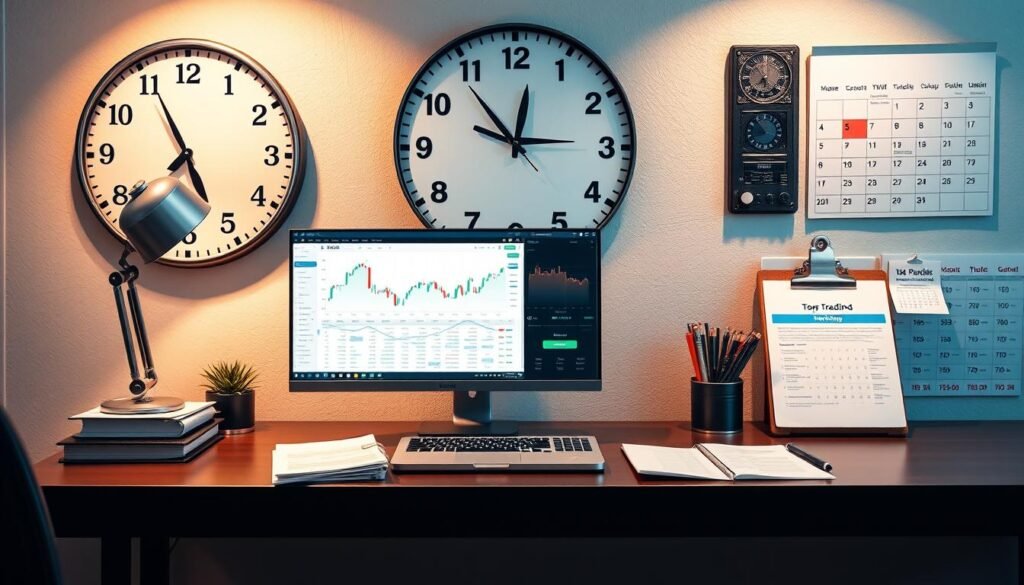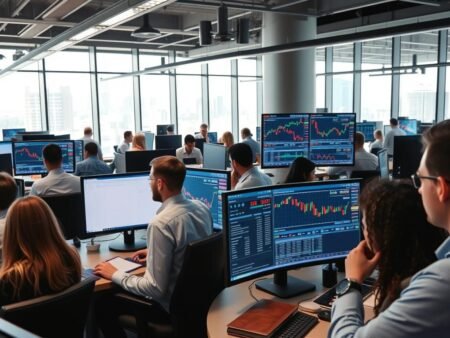Proprietary trading is more than just knowing the markets. It requires a strategic mindset, honed through experience and determination. Do you have the right tips to move from a beginner to a seasoned trader? We explore the essential tactics for success in this competitive field. These strategies are not just ideas but proven paths followed by successful traders.
Understanding the challenges of a prop trading firm is crucial. This article is your guide to success. It offers a strategic plan to pass the evaluation and handle the pressure of competitive trading.
Key Takeaways
- Grasping comprehensive knowledge of prop trading requirements is vital for success.
- Creating a realistic and adaptive trading plan aligns with high probability outcomes.
- Effective risk and money management are cornerstones of trading longevity.
- Staying disciplined under pressure is crucial for maintaining a competitive edge.
- Consistency and resilience are key traits developed by top traders over time.
- Technical analysis and proper tool utilization significantly enhance trade selection.
- Networking and staying informed are indispensable for continuous learning and growth.
Understanding the Prop Trading Firm Challenge Requirements
To succeed in a prop trading firm challenge, you need to understand the firm’s rules well. This knowledge helps with prop trading firm evaluation techniques and prop trading interview preparation.
Grasping the Rules and Conditions
Every prop trading firm has its own rules. These rules cover trading strategies, instruments, and time frames. Knowing these rules is key to avoid mistakes and follow the firm’s standards.
Knowing the Profit Targets and Drawdown Limits
Profit targets and drawdown limits are crucial. They show the firm’s risk level and guide traders to profit. Understanding these helps align strategies with the firm’s goals, boosting success chances.
| Component | Description | Impact on Trading Strategy |
|---|---|---|
| Profit Target | The specific financial goal set by the prop firm that traders need to achieve. | Dictates the aggressiveness of the trading strategies employed. |
| Drawdown Limit | The maximum allowable percentage the trading account can decline from its peak before a trader is disqualified. | Imposes risk management measures to prevent significant losses. |
Developing a Comprehensive Trading Plan
In the world of proprietary trading, making a detailed and flexible trading plan is key. This is especially true when facing a prop trading challenge. The guide for prop firm challenges stresses the need for a solid plan. It should include realistic profit goals, effective risk management, and a trading style that fits the market and the trader’s skills.
Setting Realistic Profit Goals
Setting achievable profit goals is the foundation of a good trading strategy, especially in prop trading challenges. It’s vital to know what’s possible given the framework and market conditions. This helps set realistic expectations.
Risk Management Strategies
According to the prop firm challenge strategy guide, strong risk management is a must. It’s about balancing potential gains against possible losses and knowing when to close a trade. This can greatly affect success in prop trading challenges.
Choosing the Right Trading Style
Picking a trading style that matches your strengths and the market’s needs is crucial. Whether it’s day trading, scalping, or swing trading, your choice should reflect your abilities and the challenge’s specific needs.
Following these structured trading elements prepares you for the unique aspects of a prop trading challenge. It also builds habits that support long-term trading success.
| Element | Description | Impact on Prop Trading Challenge |
|---|---|---|
| Profit Goals | Realistic and based on market analysis. | Directly influences trading behavior and risk appetite. |
| Risk Management | Includes setting stop-loss orders and managing position sizes. | Crucial for limiting losses and protecting capital. |
| Trading Style | Aligned with personal skills and market opportunities. | Enhances adaptability and overall performance in the challenge. |
Analyzing Market Conditions for Optimal Trading
Starting the prop trading firm challenge means you need to understand market conditions. Knowing what the market does can really help you pass the challenge and do well in interviews. Here are the key things to watch:
To succeed in a prop trading firm challenge, you must know the market well. This includes understanding how market changes affect trading. Here’s how to do it:
- Macroeconomic Reports: Watch for GDP, employment data, and inflation indexes. These reports change how people feel about the market and how trading works.
- Geopolitical Events: Big events like elections or conflicts can shake the market. It’s important to analyze these events to make smart trade choices.
- Market Sentiment Analysis: Keep an eye on how traders feel through indicators and comments. This can tell you where the market might go.
Using systematic methods and economic calendars can help a lot. Here’s an example of how economic indicators affect the market:
| Economic Indicator | Expected Impact | Type of Volatility |
|---|---|---|
| Job Reports (e.g., Non-Farm Payroll) | High impact; often leads to significant price movements in USD currency pairs and indices | High |
| Interest Rate Decisions | Crucial for currency traders; potential for long-term trends based on rate hike or cut expectations | Medium to High |
| Inflation Data (CPI) | High relevance for all market instruments; measures purchasing trends and price stability | Medium |
Finding the right data is key. It can turn a simple trade into a winning one. Also, keep learning about market analysis. This is important for staying ahead in the game and can be a great topic for interviews.
As you get better at analyzing the market, remember it’s not just about reacting. It’s about predicting and preparing for what the market might do. This strategic thinking is what leads to success in the high-pressure world of prop trading.
Implementing Effective Money Management Techniques
In the world of prop trading, knowing how to manage money is key to doing well. It’s important to use strong risk management strategies to avoid losses and make more money. This part will show you how to figure out the best trade sizes and use stop loss and take profit orders to keep your investments safe.
Maintaining Proper Trade Size
Choosing the right trade size is crucial for managing risk. It makes sure each trade fits within your overall trading account, avoiding too much risk while aiming for big returns. Here are some important things to remember:
- Percentage of Risk per Trade: It’s wise not to risk more than 2% of your total account balance on one trade.
- Leverage: While leverage can increase gains, it also ups the risk. Think carefully about how much leverage to use in each trade.
- Market Volatility: In markets with high volatility, it’s better to use smaller trade sizes because of the bigger risk of sudden price changes.
Utilizing Stop Loss and Take Profit Orders
Stop loss and take profit orders are essential tools for traders who want to manage risks well. These orders help control risks by automatically closing trades at set loss or profit levels.
- Stop Loss Orders: These orders limit an investor’s loss on a trade. A stop loss order is set at a price level that will stop losses if the market moves against you.
- Take Profit Orders: On the other hand, take profit orders are set to lock in profits by closing a trade at a certain profit level. This is important in volatile markets where profits can quickly disappear.
By using these techniques in your trading strategy, you can reduce risks and set yourself up for success in the competitive world of prop trading. It’s the practical use of these principles that makes successful traders stand out in the field of proprietary trading.
The Psychological Aspect of Prop Trading Challenges
Prop trading challenges require a deep understanding of the psychological side. It’s key to manage stress and stay disciplined. These skills are essential for success, as they help in using the prop firm challenge strategy guide well.
Handling Pressure and Emotional Stability
Pressure is a big part of prop trading challenges. High stakes and tight deadlines test traders’ strength. Emotional stability is crucial for sticking to a plan, even when markets are volatile.
Effective strategies include meditation, exercise, and trusting your strategy. These help keep you focused and calm.
Staying Disciplined Throughout the Challenge
Discipline means following rules and strategies without letting emotions control you. It’s about making decisions that benefit your long-term success, not just quick gains. This is a core part of any prop firm challenge strategy guide.
| Technique | Description | Impact on Trading |
|---|---|---|
| Pre-market routine | Establishing a routine before markets open to ensure mental clarity and readiness. | Increases focus and reduces impulsive trades. |
| Journaling trades | Recording each trade to review performance and emotional state. | Helps identify emotional patterns that affect trading decisions. |
| Set and review goals | Setting clear, measurable goals and regularly reviewing them to maintain focus. | Aligns daily actions with broader trading objectives. |
| Stress-reduction techniques | Implementing strategies such as deep breathing or short breaks to manage stress. | Improves decision-making under pressure. |

Using these strategies well can give you an edge in prop trading challenges. They build a strong psychological foundation, as many prop trading challenge success tips suggest.
Adopting Consistent Trading Practices
For those aiming for prop trading firm challenge success, adopting consistent trading habits is key. Consistency helps refine your trading strategy and builds discipline. This is crucial during market ups and downs. We’ll look at important practices to boost your trading success.
Ensuring Every Trade Aligns With Your Strategy
To stay consistent, each trade must follow your trading plan. This includes entry and exit points, trade size, and risk management. Sticking to your strategy helps avoid trading on emotions or impulse.
Maintaining a Trade Log to Track Performance
Successful traders keep a detailed log of their trades. It helps spot successful trades under specific market conditions. It also shows your trading habits and any strategy deviations.
| Date | Trade Description | Outcome | Strategy Alignment |
|---|---|---|---|
| 10/01/2023 | Bought 500 shares of TechCorp | Profit | Yes |
| 10/02/2023 | Sold 300 shares of HealthPlus | Loss | No |
| 10/03/2023 | Bought 400 shares of AutoMobileX | Profit | Yes |
Consistency in trading means sticking to a proven method. This reduces risk and can increase profits over time. Focusing on strategy and tracking performance through logs can lead to big success in prop trading challenges.
Selecting the Most Suitable Assets and Instruments
When aiming to excel in a prop trading challenge, choosing the right assets and instruments is key. This choice can greatly affect a trader’s success. It’s important to understand the liquidity and volatility of different asset classes before trading.
Successful traders in prop trading challenges use a careful approach. They pick instruments that fit their trading style and offer good profit chances. It’s not just about what you trade, but when and how you trade it that matters.
| Asset Type | Liquidity | Volatility | Suitability for Short-term Trading |
|---|---|---|---|
| Equities | High | Medium to High | Yes |
| Forex | Very High | High | Yes |
| Commodities | Medium | High | No |
| Cryptocurrencies | Medium | Very High | Yes |
By using these prop trading firm evaluation techniques, traders can manage risks better. They can also use liquidity to make trades more efficiently. This strategic choice is crucial for success in prop trading challenges.
Utilizing Technical Analysis for Better Trade Selection
In the world of proprietary trading, learning technical analysis techniques is key. It’s essential for doing well in a prop firm challenge strategy guide. This method improves trade accuracy and meets the goals of traders.
Identifying Key Support and Resistance Levels
Technical analysis starts with finding key price levels. These levels are where the market might pause or change direction. They help traders decide when to buy or sell.
Reading Chart Patterns and Using Indicators
Chart patterns are crucial for understanding market signals. They show when prices might change. Using tools like moving averages, RSI, and MACD can also help a lot.
| Indicator | Description | Usage |
|---|---|---|
| Moving Averages | Tool to smooth out price data over a specified time | Identify the direction of the trend |
| RSI | Gauges the speed and change of price movements | Indicate overbought or oversold conditions |
| MACD | Shows the relationship between two moving averages of a security’s price | Detect changes in trend, momentum, and duration |
By using these technical analysis techniques and tools, traders can improve their strategies. This helps them do better in prop firm challenges. It makes the most of every trade chance in the market.
Enhancing Performance with Proprietary Trading Tools
The financial markets are always changing. This makes advanced trading tools and technology very important in prop trading. These tools help traders improve their strategies and do better in the market.
Using the latest technology helps traders make better choices. It makes evaluating prop trading firms more effective. This leads to more strategic and informed trading decisions.
Backtesting Strategies for Effectiveness
Backtesting is a key technique for traders. It lets them test strategies with historical data before using real money. This is vital for finding out what works and what doesn’t.
By trying out different scenarios, traders can make their strategies better. They can make sure their strategies work well even when the market is unpredictable.
Leveraging Trading Software for Efficiency
Trading software is also crucial for better trading. Today’s platforms have tools that make analysis and trade execution faster than ever. They offer features like automated trading and real-time data, which are key for success.
These tools help traders stay competitive. They make it easier to make quick and accurate decisions. This is essential in fast-paced markets.
For traders to succeed in prop trading, they need the latest tools and technology. These tools improve analysis and help traders use more effective strategies. By always updating their tools, traders can stay ahead and perform well consistently.
Time Management During the Trading Challenge
Mastering effective time management is key in a prop trading firm challenge. Success isn’t just about trading skills. It also depends on how well you manage your time between market analysis and personal life.
Allocating Time for Market Analysis
One important prop trading firm challenge success tip is to spend enough time on market analysis. Set aside specific hours each day for this. Use that time to study current trends, economic news, and investment chances.
Balancing Trading and Personal Life
Keeping a good work-life balance is vital to avoid burnout. Make sure to respect your personal time. This helps keep your mind fresh and focused, leading to better trading.
| Activity | Recommended Time Allocation | Benefits |
|---|---|---|
| Market Analysis | 3-4 hours daily | Enhanced understanding of market conditions, better preparedness |
| Trade Execution | 2-3 hours daily | Optimal trading decisions based on real-time data |
| Personal Downtime | 2 hours daily | Reduced stress, higher overall satisfaction |

Learning From Top Prop Traders’ Techniques
Prop trading has evolved over time, with some strategies proving timeless. These prop trading success strategies are key for those getting ready for the prop trading interview preparation. They are also crucial for building a successful and profitable trading career.
Looking at the methods of experienced traders shows a wide range of successful strategies. These insights are very valuable for new traders wanting to succeed in a competitive field.
- Disciplined Risk Management: Top traders use strict risk management to protect their investments. This skill is vital in prop trading.
- Consistent Strategy Application: Leading traders’ success often comes from sticking to their strategies. This is a key factor for prop trading success.
- Advanced Technical Analysis: Skilled traders use technical analysis tools and indicators. This gives them deeper market insights and helps in making better decisions.
Using these proven prop trading success strategies can improve an aspiring trader’s skills. It helps them perform well in different and often tough trading situations. Preparing for the prop trading interview by studying these methods can also increase confidence and knowledge.
Remember, becoming a successful prop trader takes ongoing learning and adapting. It’s about replicating what works and finding your own unique strategy.
Building Resilience to Bounce Back From Losses
Building resilience in trading is key to handling setbacks well. It helps traders perform better in the tough world of prop firms. This guide explores how to bounce back from losses and stay focused on goals.
Developing a Solid Recovery Plan
Recovery plans are vital for steady trading after losses. They include reviewing trades, tweaking strategies, and following strict risk rules. This approach helps traders bounce back financially and emotionally, keeping them on track with the prop firm’s goals.
Keeping Emotions in Check After Setbacks
Mastering emotional control is a big plus in trading’s ups and downs. It lets traders make smart, strategic choices instead of acting on emotions. This boosts their resilience during hard times.
| Aspect | Recommendation | Objective |
|---|---|---|
| Emotional control | Practice mindfulness and psychological distancing | Reduce impulsive trading decisions |
| Risk management | Adjust trade size, set tighter stop losses | Limit potential losses and protect capital |
| Strategy revision | Analyze and improve existing trading strategies | Increase adaptability and potential profitability |
Top 5 Strategies to Pass a Prop Firm Challenge
To succeed in prop trading, you need specific strategies. Here are the top methods to help you how to ace a prop trading challenge
- Develop a Robust Trading Plan: Start with a solid plan. It should outline your entry and exit strategies, risk management, and profit goals.
- Effective Money Management: Manage your risks well. Adjust your position sizes based on market volatility and conditions.
- Understand Market Conditions: Being flexible is key. Adapt to market changes as part of the prop trading firm challenge success tips.
- Maintain Psychological Resilience: Emotional control is vital. Stay disciplined and avoid impulsive decisions.
- Regular Analysis and Review: Always check your strategies and performance. Make changes to fit the market.
By focusing on each strategy, you’ll greatly improve your chances in any prop trading firm challenge.
| Strategy | Description | Benefit |
|---|---|---|
| Robust Trading Plan | Includes entry/exit rules and risk management | Minimizes losses, maximizes profits |
| Money Management | Adapt position size based on market conditions | Maintains account stability |
| Market Adaptability | Adjust strategies to align with current trends | Capitalize on prevailing market opportunities |
| Psychological Resilience | Manage emotions, prioritize logical decisions | Ensures long-term trading consistency |
| Regular Review | Analyze and refine trading strategies | Enhances strategy effectiveness over time |
Networking and Mentorship for Continuous Improvement
The world of trading is always changing. Networking in trading and importance of mentorship are key. They offer new views and seasoned advice that can shape a trader’s career.
Networking in trading is vital for finding hidden chances and getting access to valuable resources. It also leads to potential partnerships. These partnerships can improve your trading by sharing knowledge.
Seeking Guidance from Experienced Prop Traders
Getting advice from seasoned prop traders can help you understand and use complex trading strategies better. Working with experts who have successfully navigated market ups and downs offers valuable insights. This mentorship is crucial for quick learning and avoiding common trading mistakes.
Participating in Trading Forums and Discussion Groups
Joining trading forums and discussion groups is a smart move. It lets you tap into the community’s collective knowledge. These platforms are great for sharing ideas, getting feedback on strategies, and discussing market trends. This can help you make better trading decisions and improve your strategies and risk management.
| Benefits | Activities |
|---|---|
| Insight into emerging market trends | Regular participation in webinars and online forums |
| Direct mentorship from successful traders | One-on-one mentorship sessions and shadow trading |
| Real-time trading advice | Engagement in live trading chat rooms |
| Strategic trade planning | Collaborative strategy sessions in discussion groups |
| Risk management tactics | Workshops and case study analysis with mentors |
Staying Updated with Financial News and Events
In the fast-paced world of trading, staying informed is key. Being able to understand and act on financial news and global events is crucial. This part talks about why it’s important to keep up with global economic signs and world events that can change market conditions.
Understanding the Impact of Economic Indicators
Economic indicators help traders predict market trends and make smart choices. They include GDP growth, job numbers, and inflation rates. These numbers show how a country’s economy is doing and where it might go next. It’s important to watch these indicators to guess market moves and adjust trading plans.
Reacting to Geopolitical Developments
World events greatly affect how people feel about the market and can quickly change its direction. Things like political troubles, policy shifts, wars, and diplomatic issues can make markets very unstable. Traders who keep up with these happenings can manage risks better and find chances by changing their plans based on global changes.
For traders, knowing about economic signs and reacting to world events is essential. It’s not just about understanding news; it’s also about thinking critically and making quick decisions. This helps take advantage of or avoid risks from these events.
Perfecting Your Trading Strategy with Simulator Practice
In today’s fast-changing financial world, simulator trading practice is key. It helps you learn the market without losing real money. This way, you get to know the market better and make the most of demo account benefits, which are vital for all traders.
Using Demo Accounts to Hone Skills
Starting out in trading or improving your skills, demo accounts are perfect. They let you try different trading methods without losing money. This is a big plus, showing the great demo account benefits.
Adapting to Different Market Scenarios
Markets can change quickly and unpredictably. Simulator trading lets you practice adapting to these changes. It helps you make better decisions in different market situations.
Here’s a table showing how simulator trading helps in different market situations:
| Market Condition | Strategy Tested | Outcome with Simulator Usage | Outcome without Simulator |
|---|---|---|---|
| High Volatility | Short Selling | Improved risk management | Potential high loss |
| Stable Market | Long Term Investments | Strategy optimization | Missed optimization opportunities |
| Bear Market | Hedging | Risk reduction effectiveness | Higher risk exposure |
| Bull Market | Day Trading | Enhanced profit capturing | Reduced profit potential |
The table clearly shows the benefits of simulator trading practice. It lets you test and improve strategies in a safe space. This way, you’re better prepared for real market challenges, making the most of demo accounts.
Preparing for the Prop Firm Interview
Getting ready for a prop trading firm interview is a big deal. You need to show you know a lot about market analysis and making money. It’s also important to be good at evaluating prop trading firms.
Prop firms want people who can handle the ups and downs of trading. Before the interview, think about your past trades. Explain your strategies, how you manage risks, and why you made certain decisions.
Being able to talk about your successes and failures is key. It shows you’re ready to do well in the firm’s environment.
Also, learn about the prop firm’s way of doing business. Understand what they trade and focus on. This helps you talk about your skills in a way that fits their needs.
Knowing about economic news and world events is also important. It shows you can spot chances and risks quickly. Being open to learning and showing you’re proactive is a big plus.
By matching your skills with the firm’s goals, you show you’re ready for the trading world. This is a big step towards your career goals in finance.












